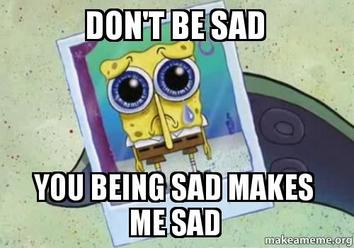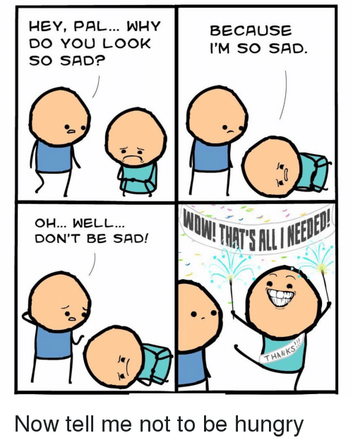 Hello, good friends! I apologize for my blogging absence as of late, I do have a good reason though. I was out of the country in the Dominican Republic for a little bit, then I got sick, and then book two in “The Monster of Selkirk” series launched, so I am 2-for-2 on illnesses during book launches. But as it’s been a week and my energy has returned/is returning, and a few of the early book reviews for “The Heart of the Forest” have come in, I wanted to share an element from my life that was weaved throughout the latest book. I’ve mentioned before on my blog tours and what not, that I enjoy using fantasy, particularly young adult fantasy, to give young people a safe place where they don’t feel so alone, and that is most prevalent in “The Heart of the Forest”. I am going to avoid spoilers, but there is a moment in the second book where Tallis is dealing with something very traumatic and heart wrenching, and Tomas tries to comfort her, he wants her to feel better, and to feel better NOW. On the surface, this is natural, we’ve all been there in one form or another. We’ve dealt with terrible things, or know someone who was going through something devastating and we wanted to do whatever we could to make them feel better. But Tallis gets mad at Tomas for this, and basically tells him that what she needs most is to be allowed to feel her feelings, she needs to grieve for as long as she needs to, and she doesn’t want Tomas to “try and make her feel better” just because her sadness makes him uncomfortable.  Take a moment to think about that, if you will. Our intentions for wanting our friends and family to feel better when they are depressed or upset comes from a good place: we don’t like seeing people we care for suffer. But part of that desire to make them feel better, is because their sadness does indeed make us uncomfortable. We can’t understand how they process their feelings, even if we have been in similar situations. We’ll never really know how they feel. So when they are depressed, we want them to, well, not be depressed because we’re generally good people and their sadness makes us uncomfortable to be around. Conversely, when people are grieving or going through something traumatic, they often feel like they are not allowed to process those emotions for very long. As if there is a time limit on how long someone can mourn. But people, especially young people, need to know that it is absolutely okay to not be okay. That you can feel your feelings for as long as it takes you to process them and the terrible situation you find yourself in. It’s okay to take as much time as you need. In other words: you do you. I was so excited when a reviewer found this section of the book and latched on to it, because it was done very purposefully. Not just because I think it’s an important part of mental health and something more people should be okay with, but because I have been in this situation, as I’m sure many people have.  I was going through a tough time, I felt like my life was crumbling, everything I worked so hard for slipping through my fingers. I was let go from my job and had nothing to fall back on, I was struggling with trying to figure out what to do with my life next, I was floundering with ideas of self-worth… I was a mess and I was depressed; I could barely eat, let alone sleep, and I had a tendency to wallow everywhere I went. My husband, bless his heart, wanted me to feel better. And he tried, he really did, to alleviate my burdens and remind me that I was, and am, loved. But that didn’t change the situation I was in so my depression remained and he got upset. He didn’t understand why I was still this way, why I couldn’t just get over it. I felt like I had to be done being terrified of the situation I found myself in, but putting on a brave face and denying my persistent panic attacks wasn’t the answer, either. I eventually went to see a therapist to talk about these things, and he told me how uncomfortable our sadness makes others who do not share it, even if they love us and just want us to be okay. Its why we tend to bring food over to people who have just lost a loved one, it’s a universal way of trying to make someone feel better when they are going through something profound and terrible that we can’t comprehend. There’s a reason we call it comfort food, after all. When my therapist talked to me about this, it felt like a weight was lifted. It made sense why my husband, who loves me, would make me feel bad about feeling bad, even if he didn’t intend to. After that, I gave myself permission to feel my feelings for as long as I needed to, even if that meant telling people to just give me space so I could do just that. Eventually, my head resurfaced, and I had a deeper understanding of myself and my own mental process, and I wouldn’t have achieved that if I hadn’t allowed myself to feel bad, and to accept that it’s okay to not be okay. I thought that was important enough to include in my fantasy world, that little piece of knowledge and acceptance I stumbled across with my therapist while trying to achieve better personal mental health. I want people to feel comfortable talking about this, but I know it’s a touchy subject for a lot of people. So, I figured that if I put it in my books, that maybe it would help someone else, that it would let them know that it’s fine, you can be sad for as long as it takes, you do you.
If you’ve read the books, I’d love to know what other parts you found that really spoke to you the way it did to the blogger, Roxie. She caught something I did very deliberately that I am so glad she wrote about in her review, but if there are other parts, please share them with me so we can have a nice little chat about it! And remember, it’s okay to not be okay, you do you.
0 Comments
Leave a Reply. |
Archives
April 2023
|

 RSS Feed
RSS Feed